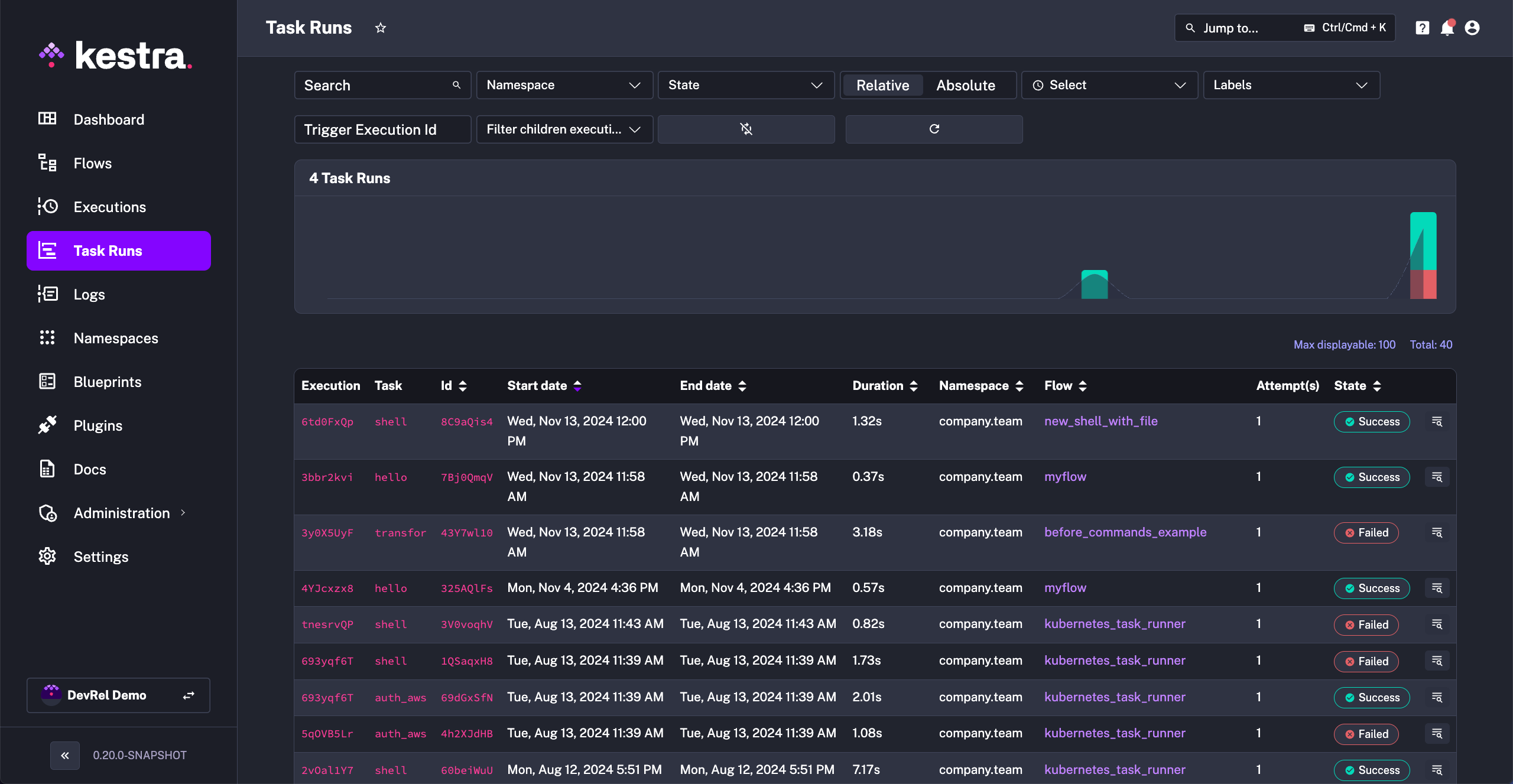 Task Runs
Task Runs
A Task Run is a single run of an individual task within an Execution, where an Execution is a single run of a flow. This means an Execution can have many Task Runs.
Each Task Run has associated data such as:
- Execution ID
- State
- Start Date
- End Date
Attempts
Each task run can have one or more attempts. Most task runs have only one attempt, but you can configure retries for a task.
If retries have been configured, a task failure will generate new attempts until the retry maxAttempt or maxDuration threshold is hit.
States
Similar to Executions, Task Runs cans be in a particular state.
| State | Description |
|---|---|
CREATED | The Execution or Task Run is waiting to be processed. This state usually means that the Execution is in a queue and is yet to be started. |
RUNNING | The Execution or Task Run is currently being processed. |
SUCCESS | The Execution or Task Run has been completed successfully. |
WARNING | The Execution or Task Run exhibited unintended behavior, but the execution continued and was flagged with a warning. |
FAILED | The Execution or Task Run exhibited unintended behavior that caused the execution to fail. |
RETRYING | The Execution or Task Run is currently being retried. |
RETRIED | An Execution or Task Run exhibited unintended behavior, stopped, and created a new execution as defined by its flow-level retry policy. The policy was set to the CREATE_NEW_EXECUTION behavior. |
KILLING | A command was issued that asked for the Execution or Task Run to be killed. The system is in the process of killing the associated tasks. |
KILLED | An Execution or Task Run was killed (upon request), and no more tasks will run. |
For a detailed overview of how each Task Run transition through different states, see the States page.
Expression
You can access information about a taskrun using the {{ taskrun }} expression.
This example returns the information from {{ taskrun }}:
id: taskrun
namespace: company.team
tasks:
- id: return
type: io.kestra.plugin.core.debug.Return
format: "{{ taskrun }}"
The logs show the following:
{
"id": "61TxwXQjkXfwTd4ANK6fhv",
"startDate": "2024-11-13T14:38:38.355668Z",
"attemptsCount": 0
}
Task Run values
Some Flowable Tasks, such as ForEach and ForEachItem, group tasks together. You can use the expression {{ taskrun.value }} to access the value for that task run.
In the example below, foreach iterates twice over the values [1, 2]:
id: loop
namespace: company.team
tasks:
- id: foreach
type: io.kestra.plugin.core.flow.ForEach
values: [1, 2]
tasks:
- id: log
type: io.kestra.plugin.core.log.Log
message:
- "{{ taskrun }}"
- "{{ taskrun.value }}"
- "{{ taskrun.id }}"
- "{{ taskrun.startDate }}"
- "{{ taskrun.attemptsCount }}"
- "{{ taskrun.parentId }}"
- "{{ taskrun.iteration }}"
This outputs two separate log tasks, one with 1 and the other with 2.
Parent Task Run values
You can also use the {{ parent.taskrun.value }} expression to access a task run value from a parent task within nested flowable child tasks:
id: loop
namespace: company.team
tasks:
- id: foreach
type: io.kestra.plugin.core.flow.ForEach
values: [1, 2]
tasks:
- id: log
type: io.kestra.plugin.core.log.Log
message: "{{ taskrun.value }}"
- id: if
type: io.kestra.plugin.core.flow.If
condition: "{{ true }}"
then:
- id: log_parent
type: io.kestra.plugin.core.log.Log
message: "{{ parent.taskrun.value }}"
This iterates through the log and if tasks twice as there are two items in values property. The log_parent task logs the parent task run value as 1 and then 2.
Parent vs. Parents in Nested Flowable Tasks
When using nested Flowable tasks, only the direct parent task is accessible via taskrun.value. To access a parent task higher up the tree, you can use the parent and the parents expressions.
The following flow shows a more complex example with nested flowable parent tasks:
id: each_switch
namespace: company.team
tasks:
- id: simple
type: io.kestra.plugin.core.log.Log
message:
- "{{ task.id }}"
- "{{ taskrun.startDate }}"
- id: hierarchy_1
type: io.kestra.plugin.core.flow.ForEach
values: ["caseA", "caseB"]
tasks:
- id: hierarchy_2
type: io.kestra.plugin.core.flow.Switch
value: "{{ taskrun.value }}"
cases:
caseA:
- id: hierarchy_2_a
type: io.kestra.plugin.core.debug.Return
format: "{{ task.id }}"
caseB:
- id: hierarchy_2_b_first
type: io.kestra.plugin.core.debug.Return
format: "{{ task.id }}"
- id: hierarchy_2_b_second
type: io.kestra.plugin.core.flow.ForEach
values: ["case1", "case2"]
tasks:
- id: switch
type: io.kestra.plugin.core.flow.Switch
value: "{{ taskrun.value }}"
cases:
case1:
- id: switch_1
type: io.kestra.plugin.core.log.Log
message:
- "{{ parents[0].taskrun.value }}"
- "{{ parents[1].taskrun.value }}"
case2:
- id: switch_2
type: io.kestra.plugin.core.log.Log
message:
- "{{ parents[0].taskrun.value }}"
- "{{ parents[1].taskrun.value }}"
- id: simple_again
type: io.kestra.plugin.core.log.Log
message:
- "{{ task.id }}"
- "{{ taskrun.startDate }}"
The parent variable gives direct access to the first parent, while the parents[INDEX] gives you access to the parent higher up the tree.
Task Runs page (EE)
This feature is only available on the Enterprise Edition
If you have Kestra setup using the Kafka and Elasticsearch backend, you can view Task Runs in the UI.

It's similar to the Execution View but only shows Task Runs.
Was this page helpful?